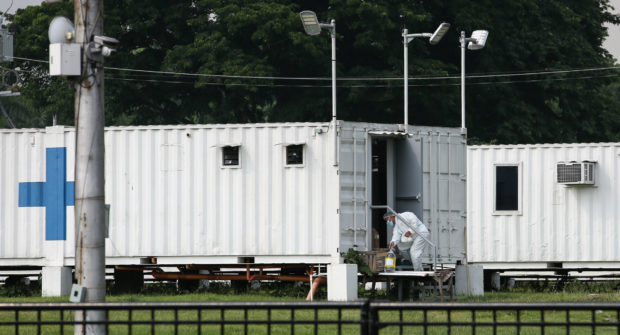Daily COVID case average in past week at 662, up by 53%

A health worker wearing a PPE suit brings inside some food and drinks left by the doorstep of a wing at the Manila COVID-19 Field Hospital. (File photo by LYN RILLON / Philippine Daily Inquirer)
MANILA, Philippines — The Department of Health (DOH) on Monday reported a total of 4,634 new COVID-19 cases between June 20 and 26, an increase of 53 percent compared with 3,051 cases recorded in the previous week.
Most of the cases, however, as confirmed by laboratory tests, were mild, asymptomatic or moderate with only 14 considered severe and critical.
The daily average in the seven-day period, on the other hand, rose to 662 new cases from 436 in the previous week.
As of Sunday, 591 cases or about 10 percent of COVID-19 admissions were in severe or critical condition, up from 554 last week.
An additional 51 deaths were recorded, mostly from last year but reported only recently, bringing the total death toll to around 60,500 out of 3.7 million confirmed cases.
The health-care utilization rate, which is one of the DOH’s key metrics in determining the alert level category, stayed below 20 percent despite the increase in COVID-19 cases.
According to the DOH, 391 or 14.9 percent of the total 2,636 COVID-19 intensive care unit (ICU) beds were in use. For non-ICU beds, 4,034 or 18.1 percent out of the 22,251 allocated for COVID-19 patients were occupied.
The DOH has said that alert level 1 will remain in effect as long as hospital admissions and the severity of admitted cases do not affect the health-care utilization rate.
But at the same time, it urged people to continue wearing face masks in public, to get vaccinated as soon as they become eligible, and to immediately isolate themselves when they experience COVID-19 symptoms.
Start planning for shift
Despite the increase in cases, the country should start planning for shifting away from the state of public health emergency first imposed in March 2020 as COVID-19 would eventually become endemic like other viral diseases.
“At least, between the government, the private sector and our advisers, we can have an exit plan moving out of the state of public health emergency. In my opinion, we are headed toward that, because the pandemic is moving toward that endemic point,” Presidential Adviser for Entrepreneurship Joey Concepcion said at the Laging Handa briefing.
According to him, pharmaceutical companies producing COVID-19 vaccines should start applying for certificates of product registration.
“Hopefully, when there’s an approval from the Food and Drug Administration, they can already sell these vaccines in our drugstores. The private sector and the general public can already buy these vaccines from drugstores like the pneumonia and flu vaccines,” Concepcion said.
This is not the first time that he has proposed the lifting of the state of public health emergency in the country to help revitalize the economy.
First declared in March 2020 by President Rodrigo Duterte through Proclamation No. 922, the state of a public health emergency would remain in force unless lifted or withdrawn by the chief executive.
“We are moving toward that endemic phase so we have to discuss what the new protocols would be when the state of public health emergency is removed. For me, it’s simple: wearing face masks and vaccination—the washing of hands and social distancing are things that Filipinos already know,” Concepcion said.
He added that people would eventually have to be responsible for their own health, including purchasing their own vaccines.
“Eventually, the government cannot continue to buy vaccines. Maybe it will continue to buy vaccines for those who cannot afford it. But for the rest of the citizens and the private sector, eventually, that responsibility should be passed on to us, because right now, two years into this pandemic, we already know how to protect ourselves,” Concepcion said.